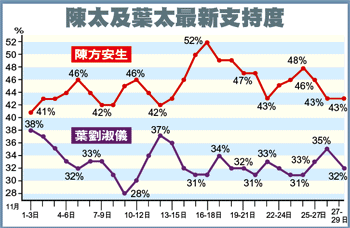
On Tuesday last week, ex-graftbuster Alex Tsui Ka-kit held a press conference to ask questions about a property transaction under Anson Chan Fang On-sang's name back in 1993. At the time, Chan was second only to then- governor Chris Patten in the former colonial administration. Tsui demanded that Secretary for Justice Wong Yan-lung investigate the transaction.Although it was the second time the issue had been brought up, most newspapers in town reported Tsui's query and the responses from Chan's election office the next day. Some, including The Standard and its sister publication Sing Tao Daily, treated it as the splash news story, while others carried the report less prominently.
The item, however, was conspicuously - if not intriguingly - missing in another Hong Kong English-language daily newspaper. This prominent daily explained a day later in a column it was old news that offered nothing new and Chan had already clarified the transaction when the same query was first brought up - also by Tsui - in 1995. It pointed out what has happened could hurt Chan's election bid.
... With respect for the editorial independence of others, it's entirely right for that other English newspaper to judge what it should do with the news in the first place. However, it's hard not to feel sorry for its readers when the paper judges what its readers should not know. It's a pity - or an encouragement - that they had to look to The Standard for what they couldn't find in their regular reading.
It's ironic that at the televised forum attended by Chan and seven other Legislative Council by-election candidates, a representative of that other English newspaper should ask Chan exactly the same question it had ignored on the first day. It's hard to comprehend, unless it had missed the news by accident.
(Apple Daily) Although The Standard did not name names, everybody knows that the "other prominent English-language daily newspaper" is the South China Morning Post. According to information, the SCMP folks had an internal discussion about the case of the old stuff about Anson Chan and determined that it was a smear during election time. Therefore, SCMP declined to join the party.
So what did SCMP-only readers miss out on? What did everybody else read about that they were filtered out from? Here is an extreme case from DAB's Jasper Tsang:[in translation]
... If the aforementioned reports were factually wrong, Mrs. Chan could have rebutted them with convincing information. Instead, Mrs. Chan did not do any such. Faced with the relentless questioning by the media, Mrs. Chan mechanically repeated a number of standard responses that were probably prepared by her political cosmeticians. First response: "This happened more than a decade ago, so why is someone bringing it up now?" Second response: "I had made a clear explanation at the time and the banks have made a clear explanation about the mortgage terms." Third response: "If the central government had doubts my character, it would not have appointed me as the Chief Secretary after the return of Hong Kong to China."
These responses were obviously attempts to evade the issue. Why was something more than ten years old being brought up again? The reason is clear: Mrs. Chan is now a candidate for the Legco and her past deeds may affect the assessment of her truthworthiness by the voters. She cannot avoid making an account to the public.
Did Mrs. Chan give an account? Did the banks explain clearly? Neither Mrs. Chan nor the banks have explained what that second property was. The media have now located the details of that second property which served as superficial evidence that Mrs. Chan's former statement was inconsistent with the factrs. Faced with these new damning evidence, can Mrs. Chan get away with saying "that she already explained"?
As for using the fact that the central government apointed her as a senior government official as proof of her character, this is pathetic and naive ... Former Secretary for Transport and Public Works of Macau Ao Man Long was also appointed by the central government. If he were to say: "If the central government suspected that I was corrupt, they would not have appointed me to be a Secretary," would that prove that he is innocent?
This is about crisis management. If the matter is simple, just provide the details of that second property and the whole thing is over and done with. Instead, the three standard responses only arouses suspicion.
If the Hong Kong Island Legislative Council By-Election were held tomorrow, who would you vote for?
Anson Chan
34.3% (November 13)
32.5% (November 16)
35.8% (November 20)
35.1% (November 23)
39.9% (November 27)
Regina Ip
21.2% (November 13)
22.2% (November 16)
26.6% (November 20)
24.5% (November 23)
22.6% (November 27)(Apple Daily) The Hong Kong University Public Opinion Programme tracking poll results are shown here (Anson Chan in red, and Regina Ip in purple).
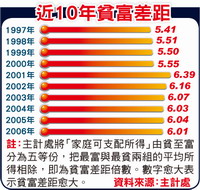
Which political party represents your interest most?
Democratic Party
06/01: 10.0%
06/04: 7.7%
06/05: 9.1%
06/07: 10.2%
06/08: 12.7%
06/09: 10.2%
06/11: 9.7%
06/12: 10.9%
07/04: 11.9%
07/11: 11.8%
Democratic Alliance for Betterment of Hong Kong
06/01: 10.4%
06/04: 9.9%
06/05: 10.1%
06/07: 9.2%
06/08: 8.7%
06/09: 8.9%
06/11: 7.4%
06/12: 7.0%
07/04: 8.1%
07/11: 15.8%
Civic Party
06/01: 4.7%
06/04: 7.4%
06/05: 6.2%
06/07: 5.6%
06/08: 5.6%
06/09: 5.4%
06/11: 6.4%
06/12: 6.8%
07/04: 7.3%
07/11: 5.0%
Liberal Party
06/01: 4.8%
06/04: 3.9%
06/05: 3.8%
06/07: 3.6%
06/08: 3.9%
06/09: 3.4%
06/11: 4.2%
06/12: 2.6%
07/04: 3.8%
07/11: 2.8%
None
06/01: 53.9%
06/04: 53.0%
06/05: 51.9%
06/07: 55.1%
06/08: 55.8%
06/09: 55.4%
06/11: 55.4%
06/12: 56.3%
07/04: 53.3%
07/11: 47.1%
Beijing Evening News commentary section editor Su Wenyang wrote on November 27: Once upon a time, a certain media outlet claimed to "be responsible for reporting everything" when in fact the media cannot do so. Insofar as the reporting on the South China tiger goes, this appears to be disproportionate with respect to over-allocation of resources. This is being irresponsible to news coverage and the readers ... in order to fill up the pages as well as attract eyeballs, the ant is inflated into an elephant. This is obviously an error in judgment ...
Beijing News comment by a Beijing citizen on November 28: In the face of the tiger photo storm, if the media ignored the raging public opinion and refused to play a guidance role, they would have truly lose the "social responsibility of news workers." Various sectors of society have affirmed that the debate over the South China tiger had a significant social meaning. So it is incomprehensible that some media outlet should accuse their colleagues of "being wrong in their choice of reporting" or even accusing them of "forgetting the social responsiblity of media workers" ... when the debate first started, some people said that whether the photos were real or faked was important, but this viewpoint has been shot down as soon as it was proposed ...
Although the quarrel between Beijing Evening News and Beijing News seem to be a minor detail in the South China tiger affair, we can say that this is an important debate over news operations and concepts that involve certain issues of resource allocation at the two newspapers. In the end, of course, the readers will decide the kind of newspaper that they want to read, whether it be Beijing Evening News, Beijing News or something else.
游盈隆 ) said. In a separate question, respondents were asked to chose between the three options of maintaining the "status quo," being independent, or becoming part of China, 45 percent of respondents favored independence, 18 percent favored unification and 22 percent of the interviewees chose the "status quo." The survey was conducted for the foundation by a polling company on Tuesday and Wednesday last week. The 1,073 respondents were aged 20 or older. The foundation said the poll had a margin of error of plus or minus 2.99 percent at a 95 percent level of confidence.A Straits Exchange Foundation poll found that Taiwanese respondents preferred independence to unification with China by 52 percent to 24 percent when the option of maintaining the "status quo" was excluded. Some respondents declined to answer the question, with around 10 percent writing in "status quo" as a third option on the survey, foundation vice chairman Michael You (
(Phoenix TV) Straits Exchange Foundation Public Opinion Poll: More than 70% of the people of Taiwan want to maintain the status quo in cross-straits relationsihp. November 29, 2007.
台湾的海基会副董事长兼秘书长游盈隆28日上午表示,根据最新民意调查结果推估,过去20年来,台湾民众有去过大陆的人数应达到650万人以上,但是台湾人民基本的政治态度差异并不大,超过75%的民众赞成继续维持两岸关系。
Taiwan Straits Exchange Foundation vice-chairman and secretary general Michael You said on the morning of November 28 that the latest public opinion poll showed that more than 6.5 million Taiwan citizens have visited mainland China over the past 20 years. But the basic political attitudes of the people of Taiwan have not changed much, with more than 75% of the people favoring the continuation of the status quo in the cross-straits relationship.
It is the same poll, but people on different sides of the Taiwan straits are getting different spins in newspapers. Does one have to go to the original source in order to find the 'truth' each time?
Here is the official report from the Straits Exchange Foundation website (兩岸開放交流20年全國性民意調查).
Q15. There has been much debate about the future of Taiwan. Some people think that unification is better, while others think that Taiwan independence is better. What is your opinion? Taiwan independence or unification?
國內對於台灣前途問題有很多爭論,有人認為兩岸統一比較好,也有人認為台灣獨立比較好。請問您的意見是怎樣?台灣獨立或兩岸統一?
44.9%: Taiwan independence
18.6%: Unification across the straits
23.0%: Maintaining the status quo
5.0%: No opinion
7.4%: Don't know
1.1%: Refused to answer
Q15.1. (Only for those who choose the status quo in Q15) If the status quo cannot be maintained, which would you choose: independence or unification, or perhaps some other option?
如果現狀無法維持,您會選擇獨立或統一,或您有其他想法?
30.9%: Taiwan independence
25.3%: Unification across the straits
17.6%: Maintaining the status quo
7.7%: No opinion
16.5%: Don't know
2.0%: Refused to answerQ15.1. (Combined 15 and 15.1 above)
52.0%: Taiwan independence
24.4%: Unification across the straits
10.1%: Maintaining the status quo
5.0%: No opinion
7.4%: Don't know
1.1%: Refused to answer
[For example: 44.9% + (23.0% x 30.9%) = 44.9% + 7.1% = 52.0%]
First of all, with respect to the Taiwan Times write-up: In
a separate question, respondents were asked to chose between the three options
of maintaining the "status quo," being independent, or becoming part
of China, 45 percent of respondents favored independence, 18 percent favored
unification and 22 percent of the interviewees chose the "status
quo." This is incorrect, since the question Q15 asks people to
choose between Taiwan independence and unification, and 23.0% of the people
provided "maintaining the status quo" on their own
initiative. In Q15.1, the status quo was explicitly excluded but
17.6% still chose that option.
If the question had been: There has been much debate
about the future of Taiwan. Some people think that unification is
better, others think that Taiwan independence is better while still others
prefer to maintain the status quo. What is your opinion? Taiwan
independence, unification or maintaining the
status quo? the percentages could be significantly different (see,
for example, the semi-annual tracking study by Election
Study Center, NSSC).
As for Phoenix TV's 75%, I cannot see how to derive it from
the published data.
Here is something else of interest here:
Q17. There are several political parties that are frequently mentioned in Taiwan. Which of these political parties have beliefs and ideas that are closest to you (read randomized list)
25.1%: Democratic Progressive Party
37.1%: Nationalist Party (KMT)
1.4%: People First Party
1.2%: Taiwan Solidarity Union
0.2%: New Party
0.4%: Pan-green camp (not to be read out)
0.3%: Pan-blue camp (not to be read out)
32.1%: No leanings towards any party
1.5%: Don't understand politics
0.8%: Refused to answer
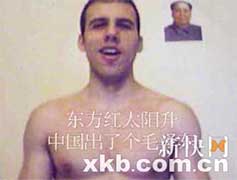
Q1. Why don't you wear any clothes when you sing? You foreign ape, you are insulting our nation!
A. I did not intend to insult China. I am a proletariat who does not even own any clothes. For a true Communist, the important thing is the thoughts and not the clothes!
Q2. What is your purpose?
A. I want to celebrate the success of the Chinese Communist Party. I want peace.Q3. Your Chinese is good enough.
A. Right. Because I learned it on my own. If you comrades are willing, you can help me improve. I have never been to mainland China. If I go there, I will definitely improve. I hope to visit China next year.Thank you for your support.
Love live the revolution!
Herre are the video links at Tudou.com and Youkou.com.
Tianya netizen 'acewel' wrote: "Many Internet affairs (mostly social ones) were either planned or magnified for one of my purposes: (1) fame; (2) traffic; (3) social responsibility; (4) plot to endanger or hurt others; (5) purely idiotic acts. The majority of Chinese netizens need to elevate their own knowledge and quality in order to avoid being exploited. The government departments should pay attention to this longstanding problem and enhance the monitoring of video sites."
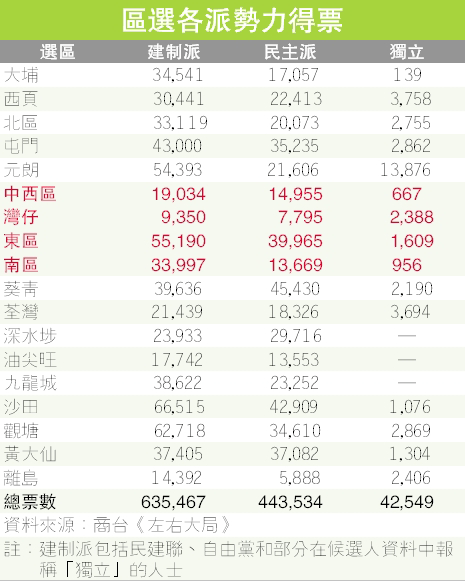
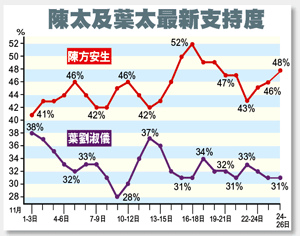
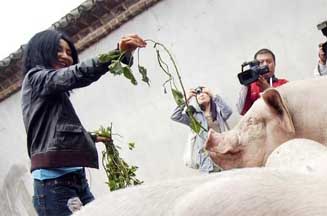
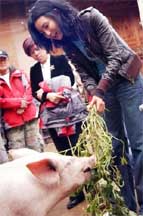
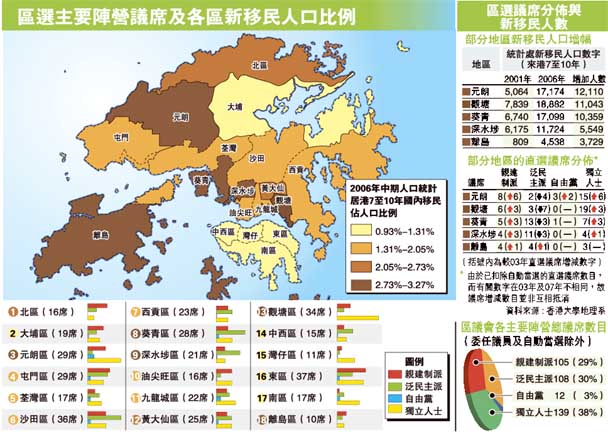
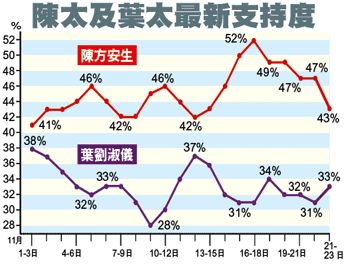
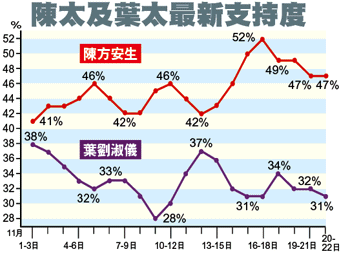
(The Guardian) November 22, 2007.
China has unexpectedly denied the USS Kitty Hawk aircraft carrier and its accompanying ships entry to Hong Kong port for a long-planned Thanksgiving holiday visit, the U.S. State Department said.
(Reuters) Happy Thanksgiving! China Allows U.S. Ship To Dock. November 22, 2007.
China refused permission for a U.S. aircraft carrier and accompanying vessels to visit Hong Kong for a long-planned Thanksgiving holiday visit -- and then changed its mind.
The USS Kitty Hawk group and its crew of 8,000 airmen and sailors had been expected in Hong Kong on Wednesday, but the U.S. State Department said the visit had been blocked by China. Hundred of relatives of crew members of the Kitty Hawk had flown to Hong Kong to celebrate Thanksgiving. Hong Kong, especially its Wanchai bar district, has been a regular port of call for U.S. sailors on "R & R" (rest and recuperation) since the Vietnam War.
The Chinese move came as a surprise just weeks after a visit to China by U.S. Defense Secretary Robert Gates, which he said he hoped would lead to a long-term dialogue. But the Chinese Foreign Ministry said on Thursday the carrier would be allowed to dock in the former British colony after all. "We have decided to allow the Kitty Hawk to stay in Hong Kong during Thanksgiving," spokesman Liu Jianchao told a news conference. "It is a decision based on humanitarian considerations only."
All this commotion leads to revive my favorite non-news story of all times:
(New York Times) Flotilla Is Beijing's Message To an Unsettled Hong Kong. By Keith Bradser. May 6, 2004.
Eight Chinese warships sailed slowly down Victoria Harbor here on Wednesday, a rare show of force that comes as democracy advocates say they face growing intimidation. The lineup of two guided missile destroyers, four guided missile frigates and two submarines was the first such show of military strength since the territory's transfer to China by Britain in 1997, and represented a change of tactics by Beijing.
The Chinese military has been a nearly invisible presence here. Soldiers are required to wear civilian clothing when they leave their bases, and the main base is tucked away on an island at the western end of the harbor. But on Wednesday, sailors in dress whites lined the sides of the destroyers and frigates. The People's Liberation Army described the visit as simply an occasion to honor the navy's 55th anniversary. But there was no such visit for the 50th anniversary in 1999, and Wednesday's display came as people favoring popular elections here find themselves under growing pressure.
...
In sailing the length of the harbor after a six-day visit at a naval base at the harbor's western end, the Chinese flotilla clearly chose the most visible route. Most ships sail in or out of the western harbor without going through the central harbor, which is now limited mostly to cruise ships and occasional pleasure craft.
Joseph Cheng said that the flotilla's visit could prove a shrewd move by China because the well-behaved People's Liberation Army forces evoke feelings of patriotism among many Hong Kong residents.
Mr. Lee criticized the naval display as unnecessary. ''Nobody here wants independence, so there's absolutely no need for them to do this,'' he said.
So what is the message when Kitty Hawk sails into Hong Kong harbour this time? Who cares except for the bar owners and girls in Wanchai?
Relevant Link:
The USS Kitty Hawk affair Tim Johnson, China Rising
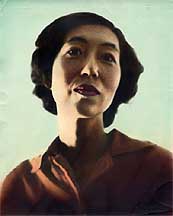
不吃辣的怎么胡得出辣子" in Chinese. Do you think that "Only cold fish won't eat hot chili" is a good translation? Does the translator lack knowledge about mahjong? Or does she assume that her readers lack that knowledge?He humored them and even sat down to play a few rounds for his wife. It was happiest day in his life and he often looked back at it in subsequent years. When the Chungking government came back at the end of the war, he was arrested and executed. But he drew comfort in his last hours from his memory of the beautiful girl who had loved him and whom he had killed.
Compare this to the English-language translation of the ending by Julia Lovell.
"Take us to dinner, Mr. Yee! Stop getting your wife to do your dirty work."
"My wife gives her own dinner. She's promised you tomorrow."
"We know how busy you are, Mr. Yee. You tell us when you're free, and we'll be there; any day after tomorrow."
"No, take us tonight. How about Lai-shi?"
"The only edible thing there is the cold buffet."
"German food is boring -- nothing but cold cuts. How about somewhere Hunanese, just for a change?"
"Or there's Shu-yu -- Ma Tai-tai didn't come with us yesterday."
"I'd rather Chiu-ju -- I haven't been there for ages."
"Didn't Yang Tai-tai hold a dinner at Chiu-ju?"
"Last time we went, we didn't have Liao Tai-tai with us. We needed someone from Hunan -- we didn't know what to order."
"It's too spicy for me!"
"Then tell the chef to make it less spicy."
"Only cold fish won't eat hot chili!"
Amid the raucous laughter, he quietly slipped out.This is not the same ending, is it? The full reasons will be explained at my talk, and it is about Taiwan politics. Whatever else, it is guaranteed that the female spy in <Lust, Caution> is NOT patented on the patriotic martyr Zheng Pingyu.
P.S. The penultimate sentence in the final published Chinese-language story is actually: "
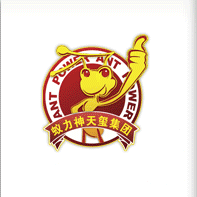
[in translation]
There is often a pendulum effect in elections. This time, the election results favored one side. The next time, the election results leans back to the other side. In the 2003 district council elections, the pan-democrats swept as a result of the July 1st effect. This time, they have to taste the bitter results of the essay victories.
Four years ago, with an appeal for "emergency help for democracy," the voters gave the pan-democrats a chance. But for the four years since, the pan-democrats did not use the time to do their district work. Four years later now, they found themselves facing a formidable enemy.
The DAB is a persistent and, more importantly, rich as well as powerful organization. Even though they lost last time due to the July 1st effect, they could provide the resources to allow their losing candidates to remain in the same districts to do district work and come back to win the next time through their resources. I mentioned that a classical case being Fu Win'gs Chung Kong-mo. He lost to the strong opponent James To twice, but he finally won this time. Ip Kwok-him's situation is more or less the same.
... In the last election, a new group of political elite emerged among the pan-democrats. They won easily as a result of the July 1st effect, but many of them underestimated the difficulty in becoming a district councilor and they were not prepared to take on the burden. Some of them scorned that the traditional democrats only knew how to organize meals, outings, water drainage and other trivial district work. They claimed that they would work on the higher-level work to spread democracy and elevate the quality and vision of the voters. The most distinguished were Civic Act-up and Cyd Ho.
But four years later, what have these "democracy theorists" and "democracy farmers" actually achieved compared to the "democratic realists" and "district workers."
Last time, four members of Civic Act-up won. One of them Cheng Kay-yip withdrew. Chan Yiu-fei did not run again in the Jardine district and no other pan-democrat was willing to attempt to run. Kam Pui-wei's successor Wei Ke-lok had 577 votes and lost badly to Lee Pik-yee's 1,080 votes. As for Cyd Ho herself, she was a star when she seized the Kwun Lung seat by defeating Ip Kwok-him. Actually, if she had done solid work, she could her set up a firm foundation for the pan-democrats. But this time, Ip Kwok-him got 2,702 votes, which was 50% more than the 1,805 votes that he got last time. A low voting turnout can explain why one's side gets fewer vote, but this cannot explain how Ip got 900 more votes. I believe that most of those votes for Ip were protest votes against Cyd Ho.
The ultimate reason was that Cyd Ho really did not care for district work, and almost every pan-democrat knew that. So after taking down Ip Kwok-him, she abandoned Kwun-long. When election time came around again, she knew that the voters were angry and she had no change. No other pan-democrat would take over the mess. So a couple of months before the election, she got someone to success her just so she can save face. It was small wonder that the defeat was so overwhelming.
In this affair, Cyd Ho is to be blamed. She established a very poor image for the pan-democrats. She caused voters (especially those in the Kwun Lung district) to misbelieve that pan-democrats always talk democracy before the elections but then they disappear afterwards. This is not the sole example among the pan-democrats, but I don't want to rub more salt into wounds.
The biggest lesson of Kwun Lung for the pan-democrats is that they must put an end to this type of political opportunism. You can participate in an election for certain political needs and reasons; you can even "parachute" into a district. But afterwards, you have to have some minimum political ethics and sense of responsibility and carry out the duties of councilor ...
I admire my friend Andrew To, because he showed that "pushing democracy along" and "doing the job of a councilor" carry no conflicts between them.
Last time, the pan-democrats won extra seats as a result of the July 1st effect. They were able to win the chairmanships and vice-chairmanships in many districts. At the time, I wrote that the pan-democrats should seize the opportunity to produce some results so that the public can gain confidence about the pan-democrats' ability to govern. But four years later, things are pretty much the same with the exception of Wanchai where Wong Ying-kay has done wonderful things.
Therefore, at the critical moment, the pan-democrats did not have any other good card to play. They cannot file the "emergency appeal to help democracy" as they have always done. The citizens have saved you for a few times, but sooner or later they ask, What does it matter to me if the democrats ask for emergency help? What changes in the district if you are saved (or not)? Slowly, the voters become numbed to these types of "emergency appeals."
[Postscript: As many of those who know well are aware, I have wanted to write this essay for some time. But I chose to publish this after the election in order not to affect the election outcome.]
Archives